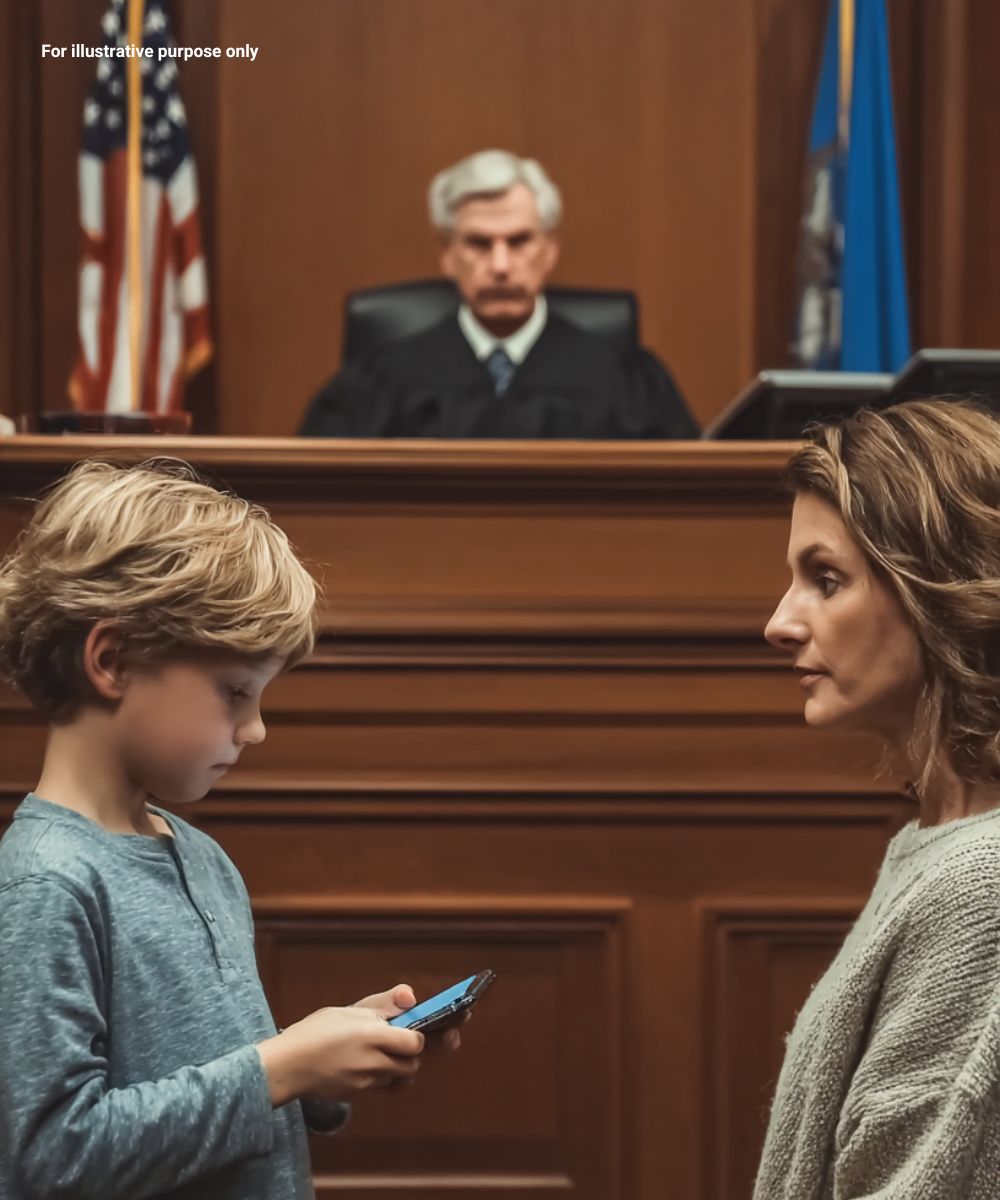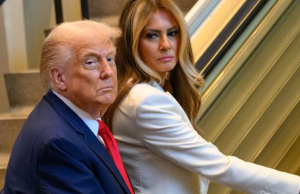
The courtroom wasn’t silent in a comforting way — it was the kind of stillness that amplifies the sound of your heartbeat until it feels unbearable. My son, Elijah, sat just a few feet from me, his feet dangling above the floor as he perched on the bench.
He was only eight, but that morning, his eyes looked older — as though time had pressed extra years onto him in the span of a few minutes.
My ex-husband, Brandon, stood across the room with his attorney. His stance was smug, his mouth curved into that familiar condescending smile he always wore when he thought he had the upper hand. His gaze remained fixed forward. Not a single glance in my direction. Not one toward our son.
The judge adjusted his glasses, shuffled some paperwork, and looked up. “Mr. Whitmore,” he said, addressing Brandon, “you’re requesting an amendment to the current custody arrangement. You claim your son wishes to reside with you full-time. Is that correct?”
Brandon nodded, his tone smooth. “Yes, Your Honor. Elijah has told me he no longer feels comfortable in his mother’s care. He wants to live with me.”
A knot twisted in my stomach. I turned my eyes to Elijah. His hands were clenched tight on his lap. I wanted so badly to reach across the space, to grab his hand, to protect him from all this. But I stayed still.
The judge shifted his attention to my son. “Elijah,” he said, voice gentle, “is that true? Do you wish to live with your father?”
My lungs seemed to lock up. I couldn’t breathe. I wanted to cry out that it wasn’t fair to ask a child this young to speak under such pressure — with strangers watching, with his father looming. But I said nothing. I just waited.
Elijah rose slowly. He didn’t respond immediately. Instead, he slipped a small object from his jacket pocket — a beat-up phone I had given him months ago to play games on. He held it up.
“I’d like to play something for the court,” he said. His voice trembled, but his words were firm.
Every eye in the courtroom turned to him. Brandon finally looked over, eyebrows raised.
“A recording?” the judge asked.
Elijah nodded. “From last night. From my dad. I didn’t know what else to do… I just thought someone needed to hear it.”
That was the moment I understood — something terrible had happened. Something I hadn’t been able to prevent. And my son had taken it upon himself to preserve the truth.
The judge glanced at Brandon, then at me, then back at Elijah. “Are you certain you want to share this?”
“Yes, sir.”
Whatever that phone held, Elijah believed it mattered enough to bring into this room. I looked at him, really looked, and saw something far beyond fear — I saw a quiet strength, something forged through pain, rising to protect what he loved.
“Approach,” the judge said.
Elijah stepped across the courtroom. The shuffle of his sneakers echoed louder than anything else. He gently placed the phone on the judge’s bench and returned to his seat beside me. I reached for his hand. He didn’t look up, but he held on tight.
The judge pressed play.
Crackling static. Then a harsh voice — Brandon’s voice — filled the room: “If you don’t say you want to live with me, I swear your mom’s gonna disappear. Got it?”
Elijah’s response came next, shaky but audible: “But… I want to stay with Mom.”
“Doesn’t matter,” Brandon snapped. “You say what I told you, or things are gonna get ugly for her.”
The air was sucked from the room. A gasp from someone in the gallery. Brandon’s attorney stared at him, stunned. Brandon’s face turned ashen.
The judge didn’t speak. He replayed the recording. When it ended, he removed his glasses and looked straight at Brandon. “Is that your voice, Mr. Whitmore?”
Brandon opened his mouth. “It… it sounds like me, but—”
“Did you threaten your child last night?” the judge interjected. His voice no longer soft.
Turning to me, he asked, “Ms. Dorsey, has your son ever shared fears about his safety before?”
I nodded, my voice caught in my throat. “Yes, especially after visits with his father. He’s asked if people would believe the truth.”
The judge exhaled slowly. “Court is recessed for fifteen minutes.” He banged the gavel.
I didn’t move. I turned to Elijah and whispered, “You recorded that?”
He nodded, tearful but calm. “I didn’t think anyone would believe me. But I thought maybe they’d believe him.” His lip trembled. I pulled him close and held him with everything I had.
When the judge returned, the room hushed again. His expression had hardened.
“I reviewed the audio multiple times,” he said. “There is no doubt it’s genuine. Mr. Whitmore, your intent was unmistakable.”
Brandon fidgeted in his chair.
“You manipulated a minor to lie in court. You issued threats to his mother. That behavior is unacceptable — not just in this court, but in any space where the safety of a child is concerned. From this moment forward, visitation is suspended pending full psychological evaluation and parenting courses. Full custody remains with Ms. Dorsey. This decision is final.”
Relief washed over me like a tide. Finally — someone saw through the lies. And the person who made it possible was the boy beside me.
“You were incredibly brave,” I whispered to Elijah as the gavel fell again.
He looked up at me. “I just didn’t want you to get hurt.”
My heart cracked and mended in the same breath. I held him tightly as Brandon walked past us without a word. Elijah didn’t even glance at him.
Outside, the sun bathed us in warmth. Elijah looked up, and I saw the version of him I knew return — the boy who giggled at cartoons and asked for two pancakes. The fear was gone.
That day wasn’t just the end of a court battle. It was the beginning of something new. Because my son had found his voice.
The car ride home was quiet. At the apartment, my mother, Carla, had a pot of soup simmering on the stove. She hugged us both wordlessly.
That night, as I tucked Elijah in, he asked, “Am I in trouble?”
I shook my head. “No, sweetheart. You did something really hard — and really brave.”
He hesitated. “Will Daddy be mad?”
“Maybe,” I said gently. “But what he did was wrong. You told the truth. And that’s never wrong.”
He rolled over, the weight of worry finally lifting from his shoulders.
Weeks passed, and Elijah slowly returned to himself. He laughed more. He asked to ride his bike. One night while we washed dishes, he looked up and said, “I think I want to be a lawyer someday.”
I laughed. “You’d be amazing.”
He smiled. “Lawyers listen when people tell the truth, right?”
“Yes,” I said, pulling him into a hug. “And the best ones protect those who can’t speak for themselves.”
That night, I opened a journal I hadn’t touched in years and wrote: “Elijah saved us. Not with anger or defiance, but with truth.”
Sometimes courage isn’t loud. Sometimes it’s a whisper in a courtroom, from a child holding a phone.
That small voice changed everything.















